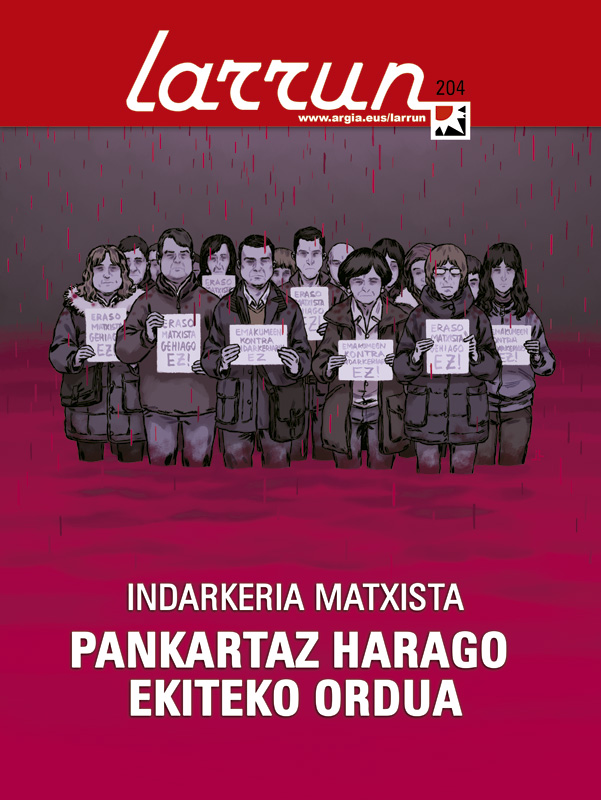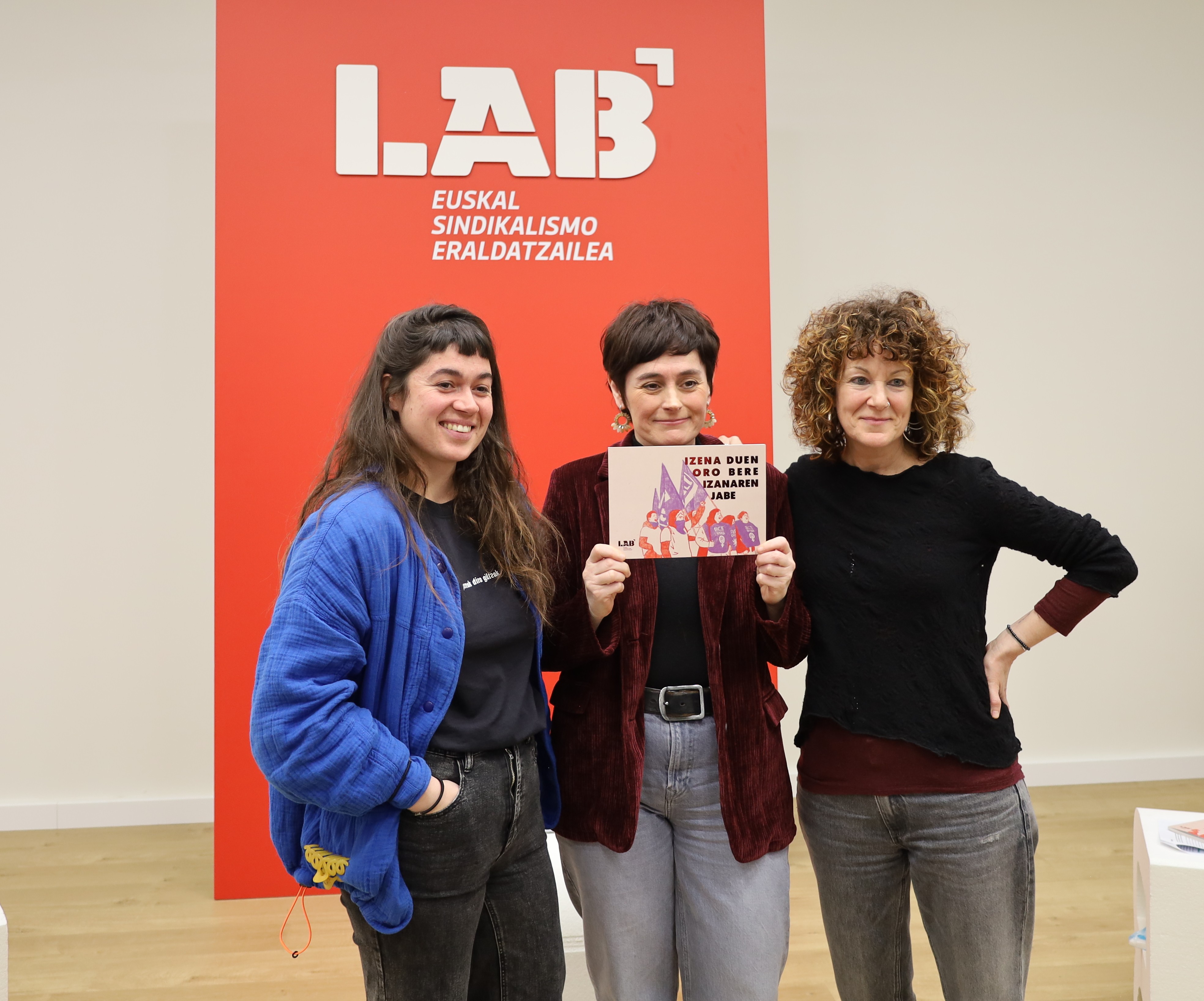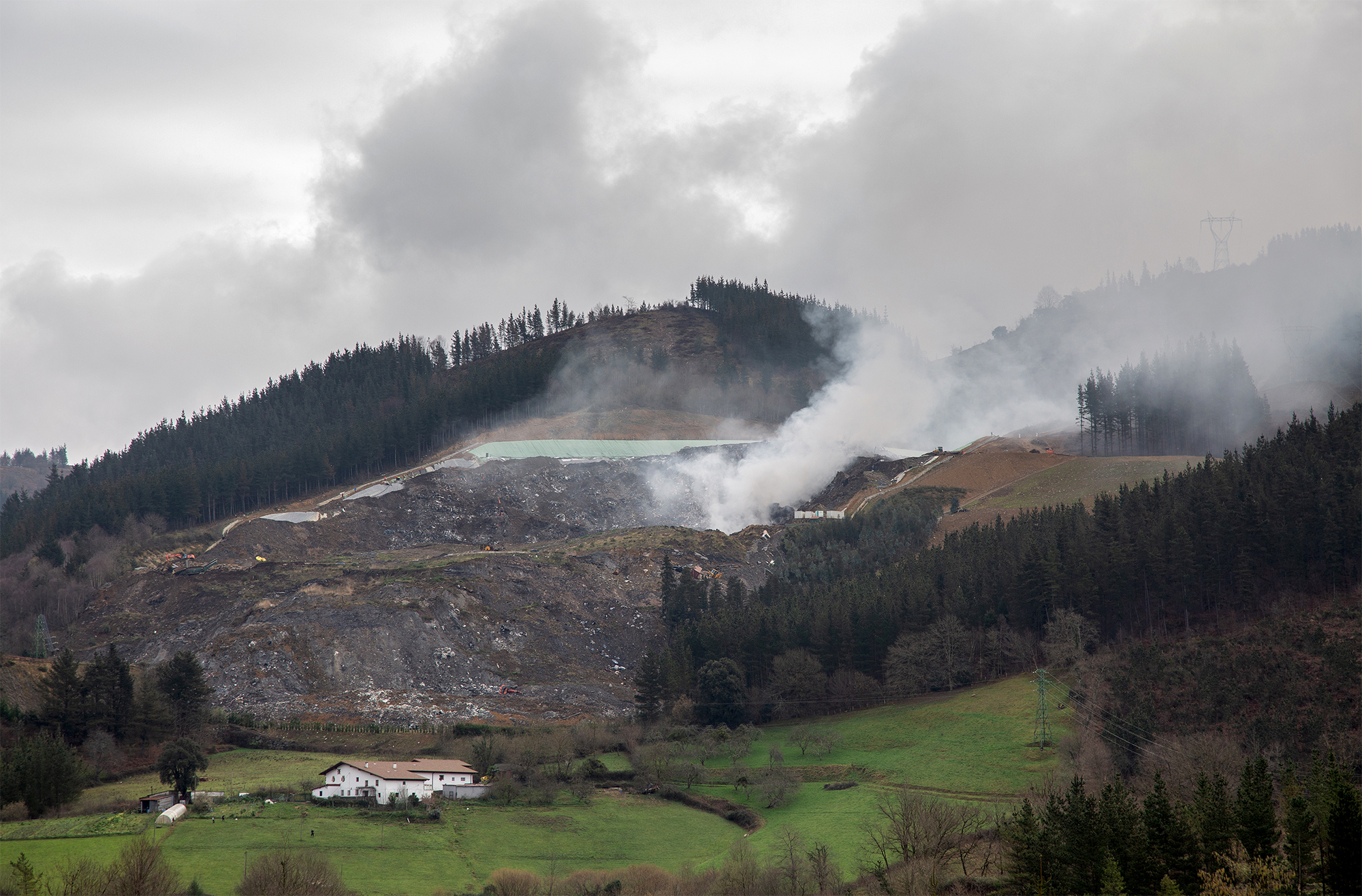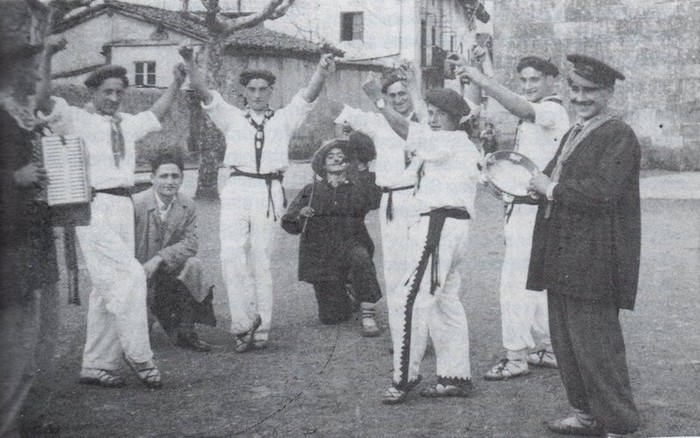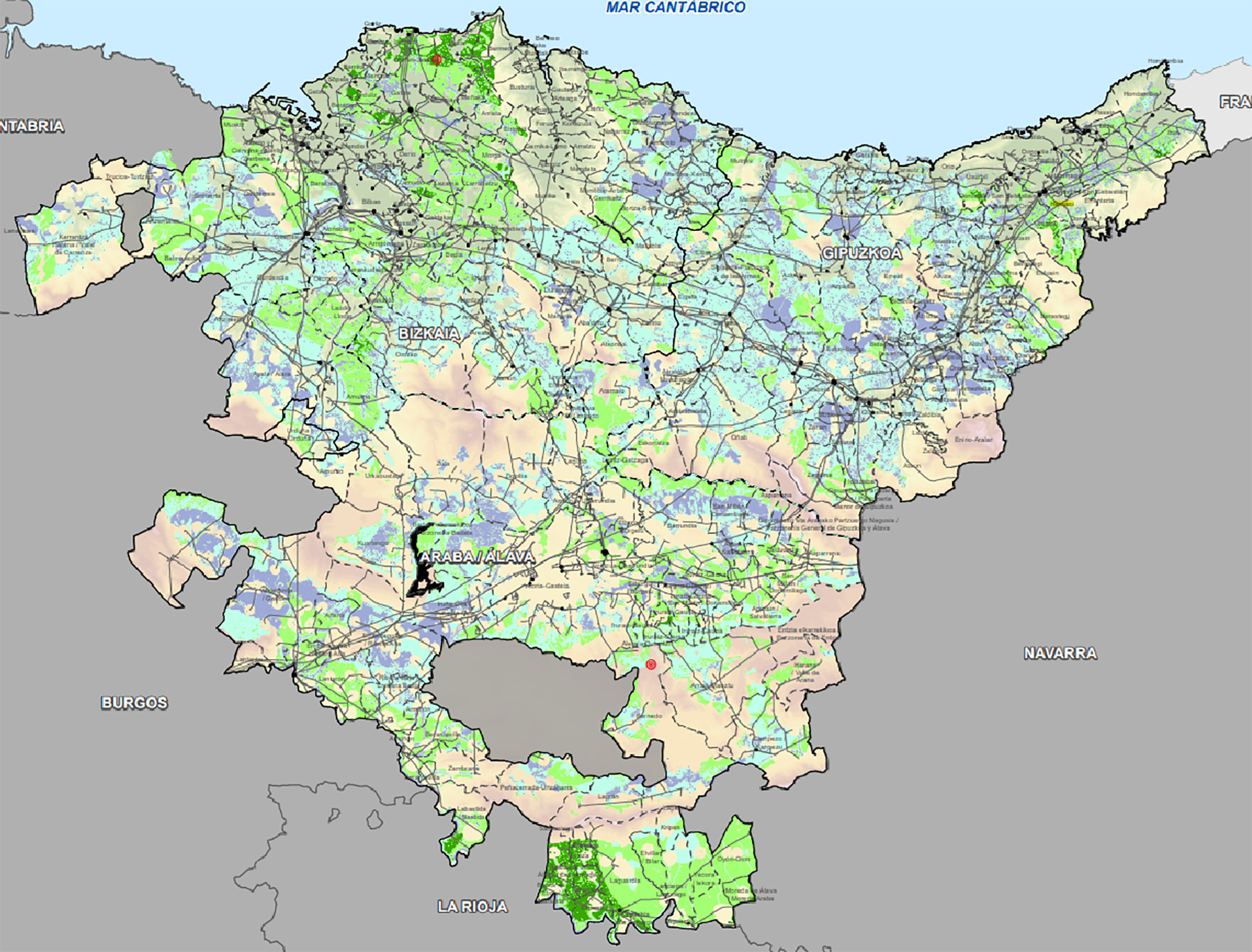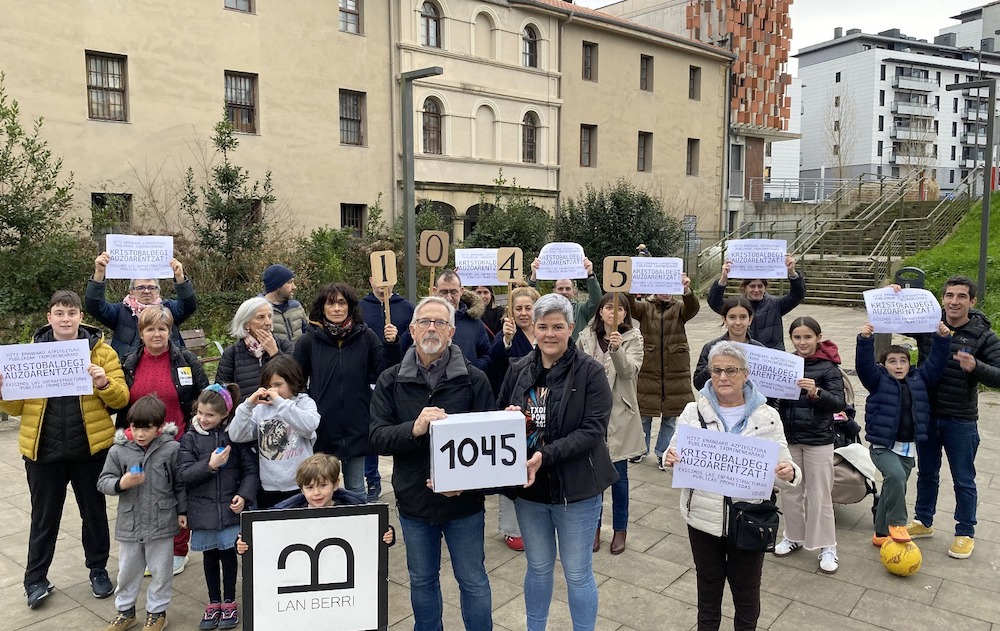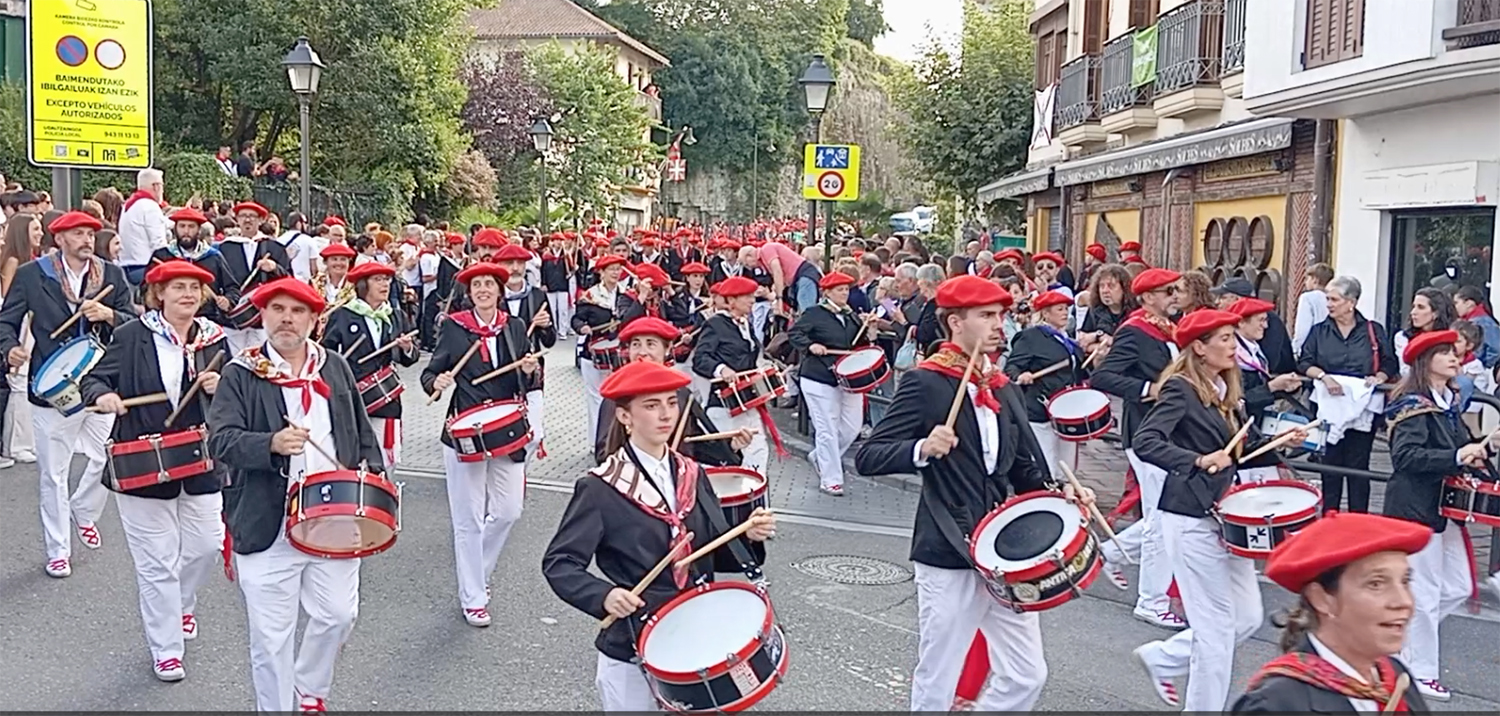Not all violence has an adequate response
- In this summer’s festivities there has been a stir here and there. Women have denounced, more than ever, sexist aggressions. Groups working in the fight against male violence have therefore organised a number of responses. Some of the actions have made them feel uncomfortable, others have become angry with the strong response of feminist women to the aggressions. The diners believe that, after the banner, society and public institutions have been brought together, and they approve it. However, we went out into the streets in the most severe forms of violence, especially when a woman was killed. The feminist movement believes it is time to go further, to assume responsibilities from the politically correct and to strongly denounce people who are considered to be mild aggressions. The nocturnal manifestation model of Pamplona has had a special relevance in this round table and has been an opportunity to learn about the most forceful reflections of the feminist movement.
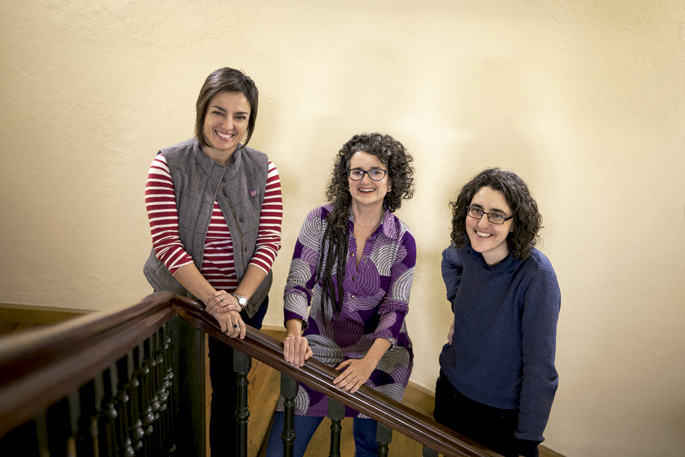
Summer has been hot. Sexual assaults and sexist assaults have been reported in several localities. The attacks have received answers and reactions have also occurred. Please, will you do the assessment this summer?
Maitena Monroy In summer I've been out and haven't followed it very closely. Even if it is nuanced, there is one thing to underline, the conclusion is positive: women have started to report violence that they did not dare to report before. I would say before: “This has happened to me, but no one else will know.” Guilt and shame were internalized. There is a change, the number of complaints about habitual abuse and sexual violence has increased, we dare more.
Complaints involve the response of groups opposed to choice and opposed to rights. We no longer have to talk about neomachists or machistas, as well as being a male chauvinist, they are contrary to choice and contrary to rights. Violence against women is a violation of human rights. These groups claim that women are victimized and that they are falsely denouncing the situation of their partners or ex-partners. We have to work against this prejudice.
Another positive aspect, at least in Bilbao (which is what I know best), is the level of response to sexist violence, although the population in favour of human rights is a minority. In summer, from May to October, the party includes the need to force women. It has not yet been broken in the imagination of many Machistan men. In general, the response of women and young women is being important, they have agitado.Lo that
we have to see is whether the answers we are giving are enough, I think not. It is true that we only went out into the streets in the murders and in particular against sexual or sexist violence.
María Viadero. It has been a summer of answers and indignation. Many groups have made a positive assessment. He has often taken to the streets to denounce the sexist attacks that have taken place in a festive atmosphere. It is usual to denounce other types of aggression, such as femicides or murders, which society considers to be the hardest. This year, denouncing violence in relation to the festive atmosphere, in the public sphere, has been different. It has contributed to expanding the complexity of violence.
Thanks to the answers of the people, the theme has gained much greater prominence in the festivities and in the media. It has been possible to widen the range of different forms of violence, it has been possible to see how they relate to each other. To justify the sexist aggressions in a festive atmosphere has to do with the imaginary that recognizes the violence, he considers it subtle to walk babe or to put his hand in the txosnas. A social debate has arisen, thanks to provocative responses.
I heard those of the comparisons say: “This year there have been more sexist aggressions.” No, many women go home and say: “Some goggles, some corrupt machists, have shook my hand.” The denunciation has become much more public and the comparsas and groups of parties have assumed the responsibility of denouncing the aggressions, both by the feminist groups that participate in the organization of the festivities and by other groups. Protocols are being internalized against aggression, etc. We are delving into the multiple forms of sexist violence that occur in the public sphere, some of them considered subtle, and they have nothing subtle. Much more is being used to justify the types of violence.
Idoia Arraiza. I agree with what Mary said. The issue has been made visible through social and public complaints and concentrations have had a media echo. I think it is important to stress that this has been achieved thanks to the struggle of the feminist movement. However, there has been a quantitative and qualitative change, the party commissions or the party organizers have approved the protocols, which has resulted in concentrations, etc. Then we will see whether the protocol and the concentration are enough or what else to do to stop the attacks.
I agree with Mary in going deeper into the types of violence. I explain it with the fir figure. The line of what is and is not a sexist aggression is getting lower and lower. So far there has been talk of mistreatment in the couple, murder and rape of an unknown person during the night, and now more subtle or perceived attitudes are also being incorporated. They are also serious and must be denounced in the same way.
It has to be said, however, that we continue to suffer a great deal of violence and too much aggression, also in summer. Faith in what everything is worth at parties is still present. We will have to reflect on what to do with the festive model, with the consumption of alcohol, which is used as an excuse in attacks.
Can we say that society has learned? Are you responding well?
M. M. I have doubts. We do not have much sociological data, but we can mention the data that the Basque Government has collected in relation to 25 November. 4 out of 10 think that women make false claims. It's a very dangerous indicator, it shows how we're not managing to break the biases of the collective imaginary. Although data indicate that the majority of the population is frightened by situations of violence. However, 33% of Spaniards believe that control in partner relationships is not violence.
That is where we have to influence, because if we are talking about concrete situations of violence, we will only do a supporting work, more concrete and aimed at protection. We want there to be no violence, and that is why we need to break down prejudices.
The Basque Government survey also included positive data.
M. M. It is true that today they are not legitimised as before, but it is now justified. Women consider themselves victims; they are hysterical, they take things out of their place, “it’s not so much”, “it doesn’t have to be put like this”, they don’t value themselves, “they are games”… The game happens in school, when there is violence against the girl the social environment will say they are games. Various levels of violence are allowed. No, that is very ugly, it is true, society has said, “so far we have arrived”. Do not die, but control...
M. 5. I regard this as a positive fact, and I was glad that in the same survey 90% of the population expressed widespread disregard for violence and I found it very interesting that inequality between men and women was mentioned as the cause of such violence. It seemed to me a very interesting qualitative leap, because violence is wrong, but we don't always associate it with inequality. I want to think about the progress, because otherwise I would be crying at home and I would not keep fighting.
M. M. Don't stay at home, let's go to the bar! [laughs all three.]
M. 5. But it is true that in the same survey it appeared that psychological abuse is not so serious, and there is the data on the alleged false denunciation. I am very concerned about the idea that we have achieved equality. When we go to university, the young people say that they are exceptional situations and that no complaint is needed. We live in an artificial bubble, and then we don't understand why violence occurs. The Department of Justice of the Basque Government says that a myth of false allegations is taking place and that much damage is being done. These kinds of prejudices, the few steps that have been taken, are terribly hurting them.
I. A. I have also seen contradictory indicators. What I see as a young man scares me. Sometimes I think we've gone back, I don't remember that in my time the 12-year-olds are saying terrible things, I say it because I give them workshops and because there are also surveys. More and more minors are suffering from serious assaults, sexual assaults and killings. Above all, the imaginary of romantic love is causing great pain, control, jealousy… It must be studied, because in the name of love they are assuming and naturalizing many attitudes in young people and are very worrying attitudes. In this respect, I do not know to what extent we have made progress.
In relation to the holiday environment, I see more awareness, or at least more work, in the holiday committees. What only women did before, now so do some men, are worrying. More people express contempt, even if the cases that are despised are the most serious. But don't stay in contempt. It is necessary to do an internal job and it is necessary to reflect on whether as a man I am also part of the problem, what roles I do, what attitudes I take. We have to go deep and we have not yet managed to reach those roots.
Some of the actions of the feminist movement have been highly criticized or have generated discomfort in different sectors of society. Next, we will look at two issues: The debate on an aggression in the Vitoria-Gasteiz festivities and the night demonstration in Pamplona/Iruña. Let's start with Vitoria.
I. A. It is a sexual assault, which was answered by the feminist movement according to the protocol approved by the party commissions and blouses. However, this response has had a social punishment, the response has been judged by the judges of the National Court. The conclusion I draw from this is that society accepts to do concentrations when there are aggressions and everything is fine insofar as we are seen as victims assaulted, “the sick! we must despise violence; we will go out into the street to say that it is very wrong to hit women.” However, when we decide that we will respond, when the victim leaves the role: “You’ve passed,” “you’ve swollen everything,” “you’re a femininity,”… In Gasteiz, that’s happened, because some of them jumped to their neck. It is not accepted that we still have the right and the legitimacy to defend ourselves.
M. 5. I felt particularly painful. The protocol was signed, the feminist movement has worked with mixed groups for years. There was a sexist aggression, the aggressors apologized and it was over. The protocol required the sending of these people through the comparsas. I mean, it's understood that this kind of violence is milder, so if I apologize, I'm going to stay like a good and understanding guy, and they won't take me out of the comparsas. When it comes to murder yes, but when it comes to other violence we have many doubts, the answer is not strong. There are no discourses on the continuum of violence, on its complexity, that is, insulting, drooling or rubbing, which is a sexist aggression.
M. M. Every approach made by the feminist movement forces us to move all of us, no one can stand, no women, no men.
To define what violence is, the credibility of women is always questioned, Mary said. Violence has to have consequences. Some women who face violence say that they have left the neighborhood or the gang, that they are the ones who have run out of friends, have torn them apart, not the aggressors. It is not enough to ask for forgiveness, it has to lose social prestige. It was agreed. In other areas the conventions are complied with. When violence against women is adapted, the long-agreed conventions are broken.
Night demonstrations in Pamplona/Iruña.
I. A. The night demonstrations have caused a great stir in the streets of the Biscay capital. On the one hand, the collective imaginary has been completely broken, that is, how we are women and what roles we have to play. Dressed in black, hooded, torches, violent, aggressive women… The assumption is different: sweet, sensitive, empathetic woman. People don't really understand that aesthetic, women can also despise that staging. Since we were young, they have taught us not to be aggressive, to cover rabies, they have told us that aggression is bad. I think that the contempt it causes in the first blow is understandable, but the important thing is to analyse why we do not claim our anger. Being able to get out of aggressiveness is one more tool to survive in the world. Women have been taken away from us, men have not.
On the other hand, the slogan “Fear is going to change part” has caused great contempt. It has been argued that nobody has to be afraid, that this does not solve anything, that violence is violence. These speeches sometimes seem utopian, even hypocritical. Does violence provoke more violence? There is a lot of violence in this society, the states themselves respond with more violence when they feel assaulted.
In addition, it is important to contextualize this phrase. What about fear, like aggression? Women have educated us in fear, it has been used throughout history as a control mechanism, let us not be in these places, let us not do these things, let us not go to those hours. Half of the population lives in fear, that is symbolic violence. I believe that the motto is a way of responding to the symbolic violence that all women experience. I don't think men have to live in fear, but the aggressors. I'd like there wasn't that much violence if we lived in society and nobody was afraid. I don't mean the physiological fear of survival, but the fears that have been built. I would like these fears to disappear, but in the meantime, I have a question to ask myself: Is it legitimate for the aggressor to be afraid enough that he does not attack? Our lives and bodies are at stake.
M. 5. The answer has been anger and indignation. People who have worked on the motto “Fear is going to change sides” have made a very strong bet. They have made a very clear provocative strategy to respond and generate a social debate. I completely agree, that staging has reaction. The model of women (calm, pedagogical, empathetic, close, sweet) has been broken. Features close to aesthetic elements related to violence have been used, but the victim model has been broken. It is still believed that women have to wait for others to free us from violence. It's broken people's schemes.
This action means a lot of the diversity of the feminist movement. I also have contradictions, but I find it interesting to combine different strategies, some more pedagogical, others more supportive, education, in the long term, others more media, social upheaval.
I'd like the aggressor to be afraid, but not because the feminists assaulted him, because we're going to feel uncomfortable, but because we're going to respond to any male aggressor. Today, many forms of violence go unpunished.
I understand very well that some groups get angry through the strategies that provoke emotion. It makes me sad, you sit behind the banner or you carry a torch or you have your head covered and you have a motto, but not everyone understands what's in your head and what your reasoning is. Some will believe that some feminist groups will begin to punish aggressors for themselves. It's not about that, but we're not going to be standing either.
M. M. Slogans don't make me feel uncomfortable, the problem is the paradigm that we want to build. What is the journey of “Fear is going to change sides”? Shame has to change in part. It is time for the aggressors to feel embarrassed. It's also because society doesn't participate. We women have not been educated in fear, but in sexual terror. Because we're afraid to do harm, rather than deal with the situation of violence. Women say “I’m going to get stuck, and I’m also afraid, poor aggressor.” The problem lies in the recognition of our right to show aggression. We've neutered ourselves. Violence is different, it is cultural and it aims to do harm.
I want to be utopian, because if I don't go to the tavern. We can make another paradigm in which at the center of social norms the vulnerability of human beings is established, not only of women, but of all human beings. We are all Syria, we are all Paris, we are all women in Congo, we are all victims of violence. It can happen to me, too.
As far as performance is concerned, it is not so new, except to put on the cap. Mary has pointed out the stigma that the victims experience and how they feel ashamed, for it is precisely on this issue that we have to face and say: “You have to feel shame, you have to cover it.” The problem is not whether they're afraid or not. The Machian men who practice violence are afraid to share their lives with women on equal terms, they are afraid of losing their power in women. I don't think it's a solution that male Machistas are afraid of what's going to happen to them later. The solution is to establish living standards, to agree on minimum standards for living well.
We have to think about exciting strategies -- and I mean, feminism is always provocative -- but we actually have to think about what we want, how do we change fear in part? No, I am ashamed to change my place. And I'm not saying that because sometimes fear is not pedagogical, we're tired of doing pedagogy.
I wanted to ask him if there's no need to do more pedagogy to understand all these things.
M. M. We have to do pedagogy for the one who has his ears washed. Yesterday at work I was telling myself that women are also violent, “how bad women are!” I thought, “Well, we see ourselves in the next life, my friend.” What will I tell you?
We need to sensitize people, who are in positions of responsibility and power, who are in public positions, but if we start with individuals, to a pedagogical point. There are prejudices that don't fight from pedagogy, you have to get to the emotions. We have to get people to feel that it's their problem. Let people feel embarrassed to have a hole next to them. Therefore, when going out in the street, we have to think well what to do, not only from the pedagogy, but also knowing if that is what we want to convey or if it is the result of the rage of the moment.
I.A. Nocturnal manifestations have not been organized to change the feminist paradigm, it is another strategy of the feminist movement, it is not a complete and definitive proposal. If it hadn't been so provocative, it wouldn't have been possible to overestimate it, disrupting the environment. The first violence has made it the center of parties or public spaces, and debating to be for or against, but debating is always going to be positive. It has not been the solution to anything. Like a thousand more things, it will become fashionable and more things will have to be reinvented.
On the cap, I understand what ghosts can ignite in Euskal Herria, but starting to make other parallels, the Zapatistas said they had to cover themselves in order to see them. On the other hand, covering all faces reinforces the collective character. I am not assaulted by being Idoia, but by being a woman. Anyone can be, and that's why, if you attack one, it's an attack on everyone, and we'll all respond.
Nobody bumps around. Violence remains at a very symbolic level. It is not a question of whether or not we are violent, but of the direction of aggression. It is not the same to use aggressiveness to attack or defend someone.
M. M. Okay, contexts are very important. That is why we cannot forget that going down here has a meaning. I believe that in this context we must face up to it. Amparanoia [the singer of the Spanish music group is Amparo Sánchez] said that when she wrote the book many women approached her saying that their heads had clicked. It is important for a famous or semi-hidden person to say that he has been the victim of male violence, to give his face. On other issues, maybe not so, we've talked about Mexicans, in other situations, or you're invisible or you're killed.
(Maitena Monroy is forced to leave the round table)
M. 5. Another thing I liked about the night demonstrations is that the focus has been on the aggressors and not on the women. Change has been strategic. In the concentrations we denounce the violence that women have often suffered, we stress the consequences that they have had on women and we do not highlight the responsibility of so many hombres.La violence cannot be justified if it is
not in a situation of self-defence. The Pamplona/Iruña strategy has been a symbolic one. In the demonstration there is a great deal of control in order to avoid any kind of situation of violence, the organizers work above all, in the face of any violent response, we do not give any excuses to oppose us.
I've talked to my friends about hanging out with my face, because that's what's most contentious. We've mentioned that part of that symbolism meant that if you touch one you touch all of us, we don't have to show our face, because we're all one. We're all together, we're a strong group fighting feminist. I do not know if the message has arrived.
I understand, violence can generate violence, and we feel uncomfortable there. But the other one, too, I understand, is a stimulus. On Sunday's family meal we were able to talk about this issue, otherwise we would not have talked about it. We need to continue to deepen the discourse to see what we are most satisfied with and what less.
I. A. We have not gathered all the feminists together and said, “Now we are going to make such demonstrations.” The one from Pamplona came out of an emotion, out of a need, I was in that group. We were working with the party commissions, organizing feminist self-defense workshops, preparing with the public institutions for the sanfermines. We were furious, at that time there was an aggression in the Chantrea neighborhood, which altered the terrain. We felt the need to give a stronger response, to go out into the street and to show our anger, to say that we are fed up. That manifestation was terribly strong, there were no banners, there was the batukada and everyone was screaming, raising their fist. I don't know how many years they've been without feeling rage at a demonstration, feeling a little bit, we've become accustomed to the manifestations where you can eat nuggets, and even though what you're claiming to be serious, you don't come in.
There was a change of attitude, it was very empowering and empowering if you've previously worked on the subject, if you've studied why you're there, covered in hats, dressed in black. Subsequently, such manifestations have been carried out in other areas of the Basque Country, but each of them has left on its own. This means that the other women have also been identified with that need, even with that aesthetic.
In some places it may have been more debatable, because the previous work has not been enough and “I don’t know why I’m here”, “I don’t know why I’ve shook my head”… and someone comes to criticize what we’re doing and I don’t know why I’m here. It's very important to know why you're there, otherwise it doesn't empower you. In Pamplona, when we pulled out a great banner in the second year, I fell a tear, you realize that you are strengthening and that empowerment is also collective. It was very useful to me.
In Euskal Herria, every time a woman is murdered, a concentration is held, organized by the World Women's March. What the protocol has is it automates the answer, you have the answer prepared, but in your life you come to consider it normal, natural. But they're killing us! It seems that nothing is happening here. There have always been first- and second-class victims in this town, and also first- and second-class violence. The sky and the earth have moved by one another and not by another. In any case, I do not mean that concentrations should be stopped, because they have a function. But it is clear that they have a very limited effect and that some of us see a need to give a different response to the violence we suffer. We need to continue to reinvent ourselves, and that is a potential of the feminist movement, its ability to use creativity and to integrate the different forms of struggle.
On the other hand, if a nighttime demonstration is organized in your village you are not obliged to go as it has been said, if you want to put your cap on, if you want to take the wig and show your breasts, teach it, everything will be welcomed. We don't all have to do the same thing and we don't have to do what we don't want. In any case, if we decide that we are not worth it and that we have to put it aside, we will do metamorphosis.
M. 5. It is true that in these demonstrations women are given the freedom to go as they want, a way to appear is proposed, but each one decides whether to cover it or not, for example. We need to reflect on the response to these demonstrations. In Bilbao, for example, during the holiday season, a large number of people and young people participated. Perhaps they have managed to get people who were not involved in any other kind of activity to approach the street.
The feminist movement and other groups are breaking their heads thinking of new strategies against male violence, at night demonstrations, on social networks, in performances, in red shoes, in women dressed in black, perhaps those that were used less before and are now using more. “No unanswered aggression,” the feminist movement said, is a perfect umbrella for gathering the set of strategies. That motto speaks of us and us, “What do you do against violence?”
I. A. Maitena says that shame has to change in part and I agree in the sense she says. We women must stop feeling shame and guilt. However, I heard Maialen Lunjabo on the radio saying that what needs to be changed in part is responsibility. You are ashamed when something has happened, and if our aim is to prevent and not to attack, I think it is more appropriate to use the term responsibility and to place public institutions and men. It dispenses with complicity and passive attitudes and ceases to be politically correct if you are not going to do anything later or you are not going to do the problem. What do you do or don't you do to perpetuate all of this?
Idoia Arraiza Zabalegi. Euskal Herriko Bilgune Feministako kidea
Iruñean 1987an jaio eta bertan bizi da. Ikerketa feministak eta generoko masterra egin zuen Euskal Herriko Unibertsitatean. Gaur egun Emagin elkarteko koordinatzailea da. Bereziki indarkeria sexistako ikastaroak eta autodefentsa feministako tailerrak ematen aritzen da. Farrukas talde feministako kidea da. Psikologia ikasi zuen eta Gestalt psikologia eskolako masterra egina dauka.
Maria Viadero Acha. Mugarik Gabeko genero arduraduna
Bilbon 1977an jaio eta bertan bizi da. Mugarik Gabe nazioartean garapenerako lankidetzan aritzen den gobernuz kanpoko erakundea da. Maria Viadero 2002tik bertako genero arduraduna da. Azaroan Indian egin ziren Beltzez Jantzitako Emakumeen 16. topaketetan parte hartu zuen. Gizarte Lanak eta Soziologia ikasketak ditu, ikerketa feministak eta generoko masterra ere bai.
Maitena Monroy Romero. Autodefentsa feministan aditua
Bilbon jaio zen 1972an. 1986. urtetik ari da autodefentsa feministari lotutako ikastaroak ematen, 500dik gora egingo zituen. Euskal Herrian eta munduan zehar eman ditu tailerrak. Hainbat talde feministatan hartu du parte: Bizkaiko Emakumeen Asanblada (1986-2011), Matarraskak (1985-1995), FeministAlde. Lanbidez fisioterapeuta da Galdakaoko ospitalean.
I don't want my daughter disguising herself as a Gypsy in the caldereros. I don’t want Gypsy children at my daughter’s school to dress up as Gypsies in caldereros. Because being a gypsy is not a disguise. Because being a gypsy is not a party that takes place once a year, with... [+]
Zerbait egin beharra izan liteke aurtengo Argia Sarietan garaikurra jaso berri dutenen oinarria. Zapalkuntzaren, bazterkeriaren, ahanzturaren aurrean antolatzearen erabakia hartu izana. Edo ilunetik argia ateratzea, zirrikituak bilatzea eta komunitateari eskaintzea. Balio... [+]
The road goes by steps, and I learned a little while ago that it seems to have already begun. But people also want to learn to fill that sentence with content. Alone we could achieve little, maybe even resignation as soon as we started. Gathering huge crowds can also complicate... [+]
Ez zuen egoki jokatu, neurriak hartu behar ziren, bestela, ez dugu ikasten. Itxuraz, ez zen ohartzen egindakoaren inpaktuaz, normal jarraitzen zuen, batzuetan, ingurukoek baino itxura zoriontsuagoz. Gainera, altuegi hitz egiten du, hori ez zaio inori gustatzen. Darabiltzan... [+]







